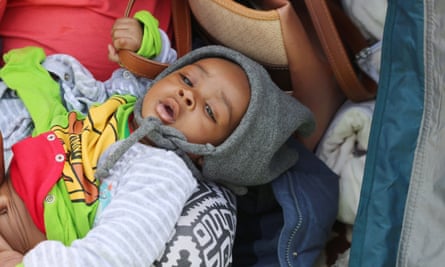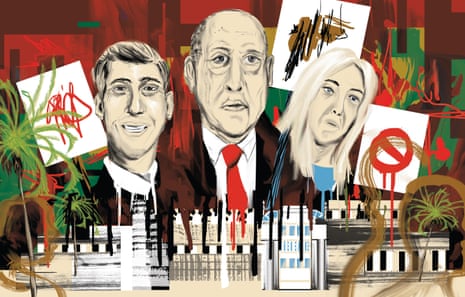A little more than 10 years ago, calls for freedom and human rights in Tunisia triggered the Arab spring. Today, black migrants in the country are being attacked, spat at and evicted from their homes. The country’s racism crisis is so severe that hundreds of black migrants have been repatriated.
It all happened quickly, triggered by a speech by the Tunisian president, Kais Saied, at the end of February. He urged security forces to take urgent measures against migrants from sub-Saharan Africa, who he claimed were moving to the country and creating an “unnatural” situation as part of a criminal plan designed to “change the demographic makeup” and turn Tunisia into “just another African country that doesn’t belong to the Arab and Islamic nations any more”. “Hordes of irregular migrants from sub-Saharan Africa” had come to Tunisia, he added, “with all the violence, crime and unacceptable practices that entails”.
For scale, the black migrant population in Tunisia is about 21,000 out of a population of 12 million, and yet a sudden fixation with their presence has taken over. A general hysteria has unleashed a pogrom on a tiny migrant population whose members have little impact on the country’s economics or politics – reports from human rights organisations tell of night-time raids and daylight stabbings. Hundreds of migrants, now homeless, are encamped, cowering, outside the International Organization for Migration’s offices in Tunis as provocation against them continues to swirl.
Josephus Thomas, a political refugee from Sierra Leone, spoke to me from the camp, where he is sheltering with his wife and child after they were evicted from their home and his life savings were stolen. They sleep in the cold rain, wash in a nearby park’s public toilet and sleep around a bonfire with one eye open in anticipation of night-time ambushes by Tunisian youths. So far, they have been attacked twice. “There are three pregnant women here, and one who miscarried as she was running for her life.” Due to the poor sanitation, “all the ladies are having infections”, he says. “Even those who have a UNHCR card”, who are formally recognised as legitimate refugees, are not receiving the help they are entitled to. “The system is not working.”
Behind this manufactured crisis is economic failure and political dereliction. “The president of the country is basically crafting state policy based on conspiracy theories sloshing around dark corners of the internet basement,” Monica Marks, , a professor of Middle East studies and an expert on Tunisia, tells me. The gist of his speech was essentially the “great replacement” theory, but with a local twist. In this version of the myth, Europeans are using black people from sub-Saharan Africa to make Tunisia a black-inhabited settler colony.
Confecting an immigration crisis is useful, not only as a distraction from Saied’s failures, but as a political strategy to hijack state and media institutions, and direct them away from meaningful political opposition or scrutiny.

The speed with which the hysteria spread shows that these attitudes had been near the surface all along. Racism towards black Arabs and black sub-Saharan Africans is entrenched in the Arab world – a legacy of slavery and a fetishised Arab ethnic supremacy. In Arab north Africa, racism towards black people is complicated even further by a paranoia of proximity – being situated on the African continent means there is an extreme sensitivity to being considered African at all, or God forbid, black. In popular culture, racist tropes against other black Arabs or Africans are widespread, portraying them as thick, vulgar and unable to speak Arabic without a heavy accent.
The movement of refugees from and through the global south has further inflamed bigotries and pushed governments, democratic or otherwise, towards extinguishing these people’s human rights. Local histories and international policies create a perfect storm in which it becomes acceptable to attack a migrant in their home because of “legitimate concerns” about economic insecurity and cultural dilution.
Globally, there is a grim procession of countries that have made scapegoating disempowered outsiders a central plank of government policy. But there is a new and ruthless cruelty to it in the UK and Europe. The European Union tells the British prime minister, Rishi Sunak, that his small boat plans violate international law, but the EU has for years followed an inhumane migrant securitisation policy that captures and detains migrants heading to its shores in brutal prisons run by militias for profit. Among them are a “hellhole” in Libya and heavily funded joint ventures with the human rights-abusing dictatorship in Sudan.
Only last week, in the middle of this storm, the Italian prime minister, Giorgia Meloni, had a warm call with her Tunisian counterpart, Najla Bouden Romdhane, on, among other topics, “the migration emergency and possible solutions, following an integrated approach”. This sort of bloodless talk of enforcement at all costs, Marks says, “speaks to the ease with which political elites, state officials, can render fascism part of the everyday political present”.
So where do you turn if you are fleeing war, genocide and sexual violence? If you want to exercise a human right, agreed upon in principle more than 70 years ago, “to seek and enjoy in other countries asylum from persecution”? The answer is anywhere, because no hypothetical deterrent is more terrifying than an unsafe present.
You will embark on an inhuman odyssey that might end with a midnight raid on your home in Tunis, a drowning in the Channel, or, if you’re lucky, a stay in Sunak and Macron’s newly agreed super-detention centres. People in jeopardy will move. That is certain. All that we guarantee through cynical deterrent policies is that we will make their already fraught journey even more dangerous.
Nesrine Malik is a Guardian columnist
Do you have an opinion on the issues raised in this article? If you would like to submit a response of up to 300 words by email to be considered for publication in our letters section, please click here.

